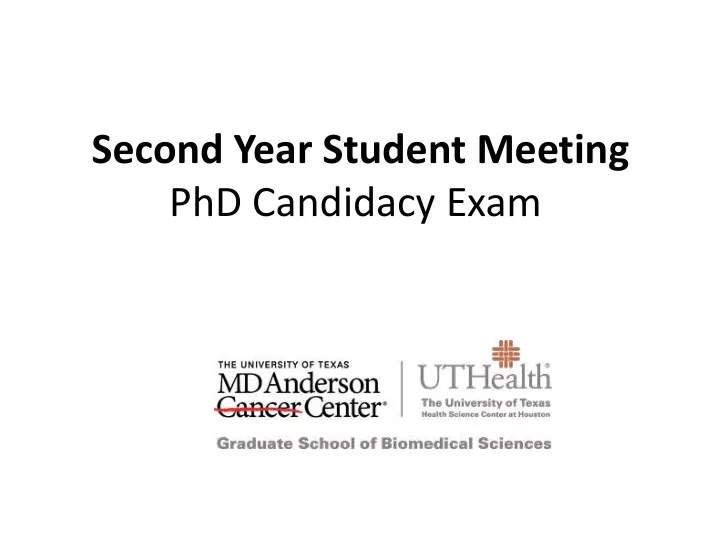

Second Year Student Meeting PhD Candidacy Exam
Petitioning for Candidacy Submit Petition for PhD Candidacy form to OAA for approval by the Academic Standards Committee (ASC) by August 31 st . Petition Includes: • Approval of Advisory Committee • Specific aims page for exam proposal (on topic) • Proposed Exam Committee ASC reviews and approves – usually with no changes. Note: Some programs have specific rules about Exam Committee.
Petitioning for Candidacy Submit Petition for PhD Candidacy form to OAA for approval by the Academic Standards Committee (ASC) by August 31 st . NEW THIS YEAR The Chair of your Exam Committee must from your Program Also: If you have a secondary area of concentration, one member (not the chair) of the Exam Committee must be a member of second program.
Timeline for current second year PhD students Submit PhD candidacy petition by August 31 Take the exam by the end of the Fall semester Now: Talk with your Program Director to confirm your exam format and get exam specifics If off-topic, pick exam subjects and begin writing abstracts Schedule an Advisory Committee meeting – send calendar invitation
Timeline for current second year PhD students Submit PhD candidacy petition by August 31 Take the exam by the end of the Fall semester By August you should: Finish writing project aims Select Exam Committee members, fill out the form Meet with your Advisory Committee to get approval for your petition. Schedule an exam date when Exam Committee members are available Discuss work schedule with your advisor
After ASC approval • Write a proposal in format of an NIH F31 fellowship “6 + 1” • Give proposal to the exam committee and GSBS two weeks before exam. • At the exam, you’ll give a presentation (format varies) then answers questions from the committee. Some program policies vary, check with your program. See GSBS website.
Feedback from others: Students may seek feedback on the exam proposal from others, such as peers and faculty including the advisor. • Final research proposal must be the original work of the student • Text must be composed entirely of the student’s writing and not that of any other person • Others may decline to give you feedback, even your advisor.
Tips Selecting and interacting with Exam Committee • Discuss selections with your advisor • Pick an experienced chairperson • Include experts on the topic of your proposal • Meet with the chair of your committee • Hand in your proposal on time • Remind your committee of time/location - 2 days before
Tips Prepare for the Exam • Be ready to: • Critique and defend your own proposal • Discuss pitfalls • Describe alternative strategies • Provide critical interpretation of data • Describe the basis for methodology • Describe recent publications on the subject • Do a mock exam – don’t use your best friends
Exam Day! Be confident and as calm as possible Remember that a conditional pass is a PASS • All committee members must be present • If anyone cannot attend, any GSBS faculty member may substitute - Contact Dr. Mattox
Candidacy Exam Pass Rate (initial attempt) 100 80 Percentage 60 of Exams 40 20 0 2012 2013 2014 2015 2016 2017 2018 2019* Academic Year Pass (unconditional or conditional) Re-exam or Fail * Year is not complete
GSBS Website – Candidacy Exam Page Example Proposals Example Presentations This PowerPoint Suggestions from Post-Candidacy GSBS Students
Thank you to our panelists: Faculty • Dr. Andrew Gladden , Assistant Professor, Genetics, MDACC • Dr. Pamela Wenzel , Assistant Professor, Pediatric Surgery, Institute of Molecular Medicine, McGovern Med School Students • Alexandra Berroyer , Microbiology & Molecular Genetics, McGovern Med School • Josephine “Kebbeh” Darpolor , Cancer Biology, MDACC • Iman Sahnoune , Neuroscience, MDACC • Cory Wilson , Biochemistry & Cell Biology, McGovern Med School And Dr. Marion Zahn from UTHealth Student Counseling
Recommend
More recommend